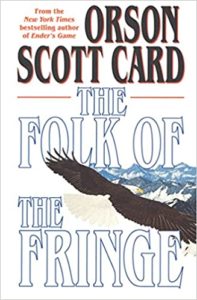 Title: The Folk of the Fringe
Title: The Folk of the Fringe
Author: Orson Scott Card
Publisher: Tor
Genre: Post-apocalyptic short fiction collection
Year Published: 1989
Number of Pages: 306
Reviewed by Liz Busby
I skimmed this book in college when writing a paper about Mormons and speculative fiction, but I had never come back and read the whole thing. I have now finally redeemed myself as an aspiring scholar of Mormon speculative lit by reading this work.
Reading some of Card’s recent books, I thought his obsession with procreation and societal structures at the expense of realistic characters was a sign that his work was going downhill from the classics I had read as a teen and young adult. But no, it turns out these were always central themes and they either went over my young head or I’ve lost my taste for his style of storytelling, where a lot of potential endings are essentially enacted through character discussion before settling on what they actually will do.
That’s not to say there’s nothing redeemable here. “West” is the most conventional story of the series, with brilliant parallels to the first Mormon migration and felt relevant considering how many far-right Mormons don’t realize that the Christian right considers them enemies not allies. “Salvage” not only has a brilliant premise (the image of the Salt Lake Temple half-submerged in a reconstituted Lake Bonneville is haunting) but also captures the uncomfortable dynamics of being a non-Mormon in Utah, which is surprising coming from an LDS author. (See, Mormon writers actually can see the faults in their own community. coughBannerofHeavencough) I thought “The Fringe” was interesting for its study in community dynamics and consideration of how disabled people would cope with the apocalypse, though maybe not in a way modern readers would be comfortable with. “Pageant Wagon” managed to perfectly capture the type of writing that goes into a typical Mormon-American pageant, and actually made me nostalgic for all the Manti pageants I suffered through as a child (RIP). “America” causes chills by its portrayal of the logical fulfillment of Book of Mormon prophecies we tend to sweep under the rug, in spite of the icky relationship between a 15yo boy and a 40yo spinster doctor.
What I didn’t expect was the epilogue where Card discusses how this collection of stories came to be. It’s more touching than the book itself, seeing that even someone who’s won the Hugo and Nebula multiple times has the impostor syndrome that all writers wrestle with and struggles with figuring out what to write, and Card doesn’t pull any punches in putting all his insecurities out there. Honestly, if this epilogue weren’t there to explain what Card was doing with the stories, I would have liked this book a lot less, which is maybe not a point in the book’s favor since a story should stand on its own without external explanation.

I remember liking the stories a lot when I read them around 1990. Probably the thrill of seeing Mormons in a speculative setting added to the experience, it was pretty rare back then.
“America” is such an odd tonal shift at the end of the collection. But the humbling of white Mormon ideas about the last days (placing Native Americans in a more powerful position) was really interesting.